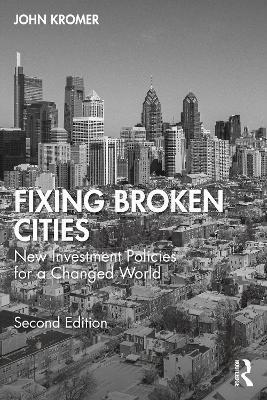Fixing Broken Cities: New Investment Policies for a Changed World

Fixing Broken Cities: New Investment Policies for a Changed World
Fixing Broken Cities explores the planning, execution, and impact of urban repopulation and investment strategies that were launched in the wake of two crises: late twentieth-century economic disinvestment and the outbreak of the COVID-19 pandemic.
Because past practices could no longer serve as a reliable guide to future outcomes in this uncertain environment, any new initiatives had to involve a significant level of risk-taking. Based on the author's experience as a policymaker and practitioner, this book provides detailed insights into the origins and outcomes of these high-risk strategies, along with an explanation of why they succeeded or failed. This new edition examines policy initiatives from a fresh perspective, based on an awareness that (1) real estate ventures are best evaluated over the long term, rather than shortly after the completion of construction activity; (2) policies that had guided the allocation of public-sector resources during past decades of urban disinvestment need to be reconsidered in light of the economic resurgence that many American cities are now experiencing; and (3) the places described in this book are representative of other municipalities, of all kinds, where the pandemic has led to a fundamental rethinking of the relationship between home and workplace.
A key theme of the book is equitable development, the question of who should benefit from the allocation of scarce public capital, and what investment policies are most likely to support this principle over the long term. The author provides realistic guidance about pursuing the best opportunities for improvement in highly disadvantaged, resource-starved urban areas, with reference to several key issues that are pressing concerns for members of urban communities: enlivening downtown and neighborhood commercial areas, stabilizing and strengthening residential communities, eliminating industrial-age blight, and providing quality public education options.
This new edition will be of great use to planning, housing and community development professionals, both regionally and nationally, as well as to students on Urban Politics and Planning courses.
PRP: 317.24 Lei
Acesta este Pretul Recomandat de Producator. Pretul de vanzare al produsului este afisat mai jos.
285.52Lei
285.52Lei
317.24 LeiLivrare in 2-4 saptamani
Descrierea produsului
Fixing Broken Cities explores the planning, execution, and impact of urban repopulation and investment strategies that were launched in the wake of two crises: late twentieth-century economic disinvestment and the outbreak of the COVID-19 pandemic.
Because past practices could no longer serve as a reliable guide to future outcomes in this uncertain environment, any new initiatives had to involve a significant level of risk-taking. Based on the author's experience as a policymaker and practitioner, this book provides detailed insights into the origins and outcomes of these high-risk strategies, along with an explanation of why they succeeded or failed. This new edition examines policy initiatives from a fresh perspective, based on an awareness that (1) real estate ventures are best evaluated over the long term, rather than shortly after the completion of construction activity; (2) policies that had guided the allocation of public-sector resources during past decades of urban disinvestment need to be reconsidered in light of the economic resurgence that many American cities are now experiencing; and (3) the places described in this book are representative of other municipalities, of all kinds, where the pandemic has led to a fundamental rethinking of the relationship between home and workplace.
A key theme of the book is equitable development, the question of who should benefit from the allocation of scarce public capital, and what investment policies are most likely to support this principle over the long term. The author provides realistic guidance about pursuing the best opportunities for improvement in highly disadvantaged, resource-starved urban areas, with reference to several key issues that are pressing concerns for members of urban communities: enlivening downtown and neighborhood commercial areas, stabilizing and strengthening residential communities, eliminating industrial-age blight, and providing quality public education options.
This new edition will be of great use to planning, housing and community development professionals, both regionally and nationally, as well as to students on Urban Politics and Planning courses.
Detaliile produsului









